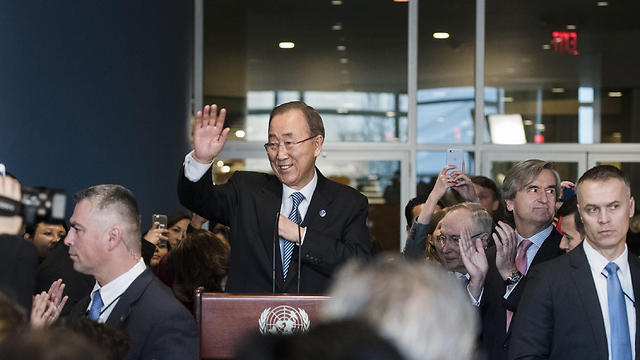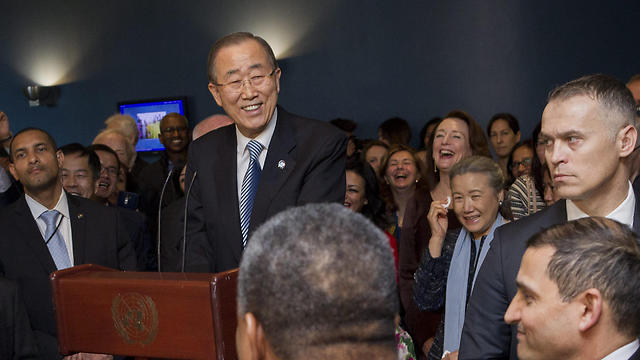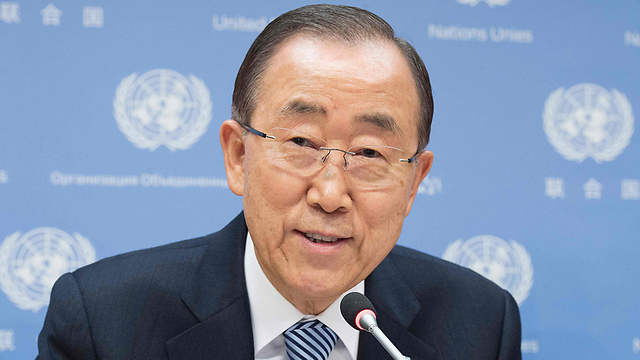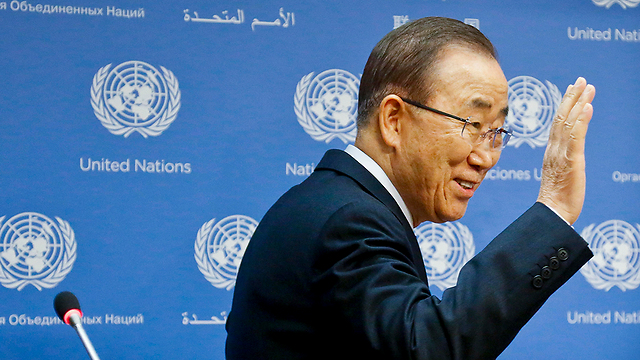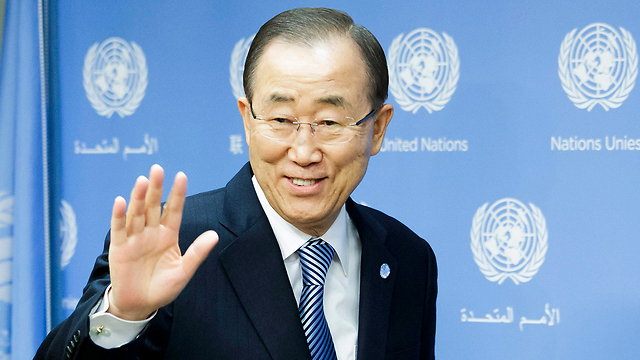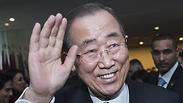
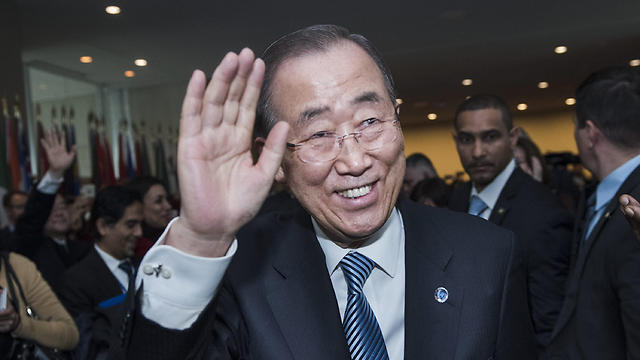
Ban Ki-moon ends 10-year tenure as UN secretary-general
Looking back at his time in office, Ban tells reporters 'this has been a decade of unceasing test.' His final act before his term ends is to push the button for the ball-drop in New York's Times Square: 'I feel like Cinderella—at midnight everything changes.'
As a final act before his term ends at midnight on New Year's Eve, the secretary-general will push the button starting the descent of the glittering 11,875-pound ball in New York's Times Square in the countdown to 2017's arrival. At that moment, former Portuguese prime minister Antonio Guterres will start his tenure as United Nations chief for the next five years.
Bidding goodbye to hundreds of diplomats and UN staff as he left United Nations headquarters Friday for the last time as secretary-general, Ban joked that he feels "like Cinderella — tomorrow at midnight, everything changes."
Flanked by the presidents of the General Assembly and the Security Council, the native South Korean thanked UN workers for their hard work and commitment over the course of his 10-year tenure, which ends at midnight Dec. 31.
“Tomorrow night on the eve of the new year, I’ll be in Times Square for the ball drop. Millions of people will be watching as I lose my job,” he said with a broad smile.
He told his colleagues he had two words for them: “Thank You.”
Ban urged staff members to stay focused on advancing UN development goals and working to address issues ranging from climate change to gender empowerment.
“Keep the focus on people — on people’s rights and people’s dignity,” he told them.
At the top of the escalator leading out of the building, a line of staffers held up signs saying “We We Love Love You You SG and Madam,” using the initials for secretary-general and paying tribute to his wife Yoo Soon-taek.
At the bottom, a line of top UN officials said farewell, many receiving hugs from Ban.
The visibly emotional secretary-general, when asked about the sendoff before walking out the door and getting into his car, said: “It’s very moving. I’m so grateful for the support and friendship that they have shown me. ... I’m honored to have served this great organization.”
'Decade of unceasing test'
Looking back at his stewardship of the United Nations at a farewell news conference earlier this month, Ban told reporters "this has been a decade of unceasing test."
While he has seen collective action improve millions of lives, Ban expressed frustration at the failure to end Syria's war, now in its sixth year, and conflicts in South Sudan, Yemen, Central African Republic and Congo, to name a few.
And in rare criticism of world leaders, he blamed unnamed presidents, prime ministers and monarchs for the turmoil in the world today—and expressed disappointment many care more about retaining power than improving their people's lives. He singled out Syria, saying he can't understand why it is being held hostage to "the destiny" of one man, Bashar Assad.
Even after leaving the UN, Ban said he will keep urging new and longstanding leaders to embrace the "pre-eminent 21st century fact"—that "international cooperation remains the path to a more peaceful and prosperous world"—and to demonstrate "compassionate leadership."
To reinforce this, the secretary-general's final trip this month was to visit the Abraham Lincoln Presidential Library and Museum in Springfield, Illinois. "Lincoln was a heroic force for equality, integration and reconciliation; and desperately, we need that spirit today," Ban said of the US leader during America's Civil War.
Ban has also expressed frustration at the way the UN operates and expectations in some quarters that the secretary-general has the power "to be some almost almighty person." That's impossible, he told the AP in September, because the UN's 193 member states make decisions and the secretary-general implements them. The UN chief cannot implement his or her own policies and initiatives.
John Bolton, who was US ambassador to the UN when Ban was selected to be secretary-general, said President George W. Bush's administration supported him because "we wanted someone who would do what the member governments wanted"—and not take the lead on issues and act as the world's top diplomat like then-secretary-general Kofi Annan.
"I think Ban Ki-moon lived up to our expectations, which is not to say I agreed with every position he took on climate change and things like that," Bolton told AP.
When the former South Korean foreign minister, who grew up during the Korean War, took over as secretary-general from Annan at the start of 2007, he promised his tenure would be "marked by ceaseless efforts to build bridges and close divides." And he made tackling global warming, then on a back burner, a top priority.
During his first term, he won plaudits for helping move climate change close to the top of the global agenda, for creating UN Women to focus on the fight for gender equality, and for speaking out early and strongly for demonstrators in Tunisia and other countries that rose up in the Arab Spring.
During his second term, his campaign for a new global climate deal culminated in the December 2015 Paris agreement. He got all 193 member states to agree on 17 new UN goals and 169 targets to combat poverty, achieve gender equality, protect the environment and ensure good governance by 2030. He called early on for an end to the Syrian conflict and he strongly backed gay rights despite opposition from many countries.
But Ban also faced criticism—in his first term for not speaking out against human rights abuses in China and Russia. In his second term, the UN's handling of the cholera epidemic in Haiti and its failure to deal effectively with sexual abuse by UN peacekeepers in the Central African Republic and elsewhere were widely criticized. Ban's temporary removal of the Saudi Arabia-led coalition in Yemen from a UN blacklist for allegedly killing children after coalition supporters threatened to stop funding many UN programs was sharply rebuked as well.
A workaholic, Ban traveled more than any of his predecessors on UN business. He said most Western leaders speak through statements, but he believes face-to-face meetings with world leaders are critical to getting support to end conflicts or promote action on issues like climate change and combatting poverty.
Despite his decade as UN chief, Ban Ki-moon is hardly a household name. He has been criticized for his lack of charisma and communication skills crucial in an increasingly globalized and interconnected world, though in private and at the off-the-record UN Correspondents Association's annual gala he has regularly displayed a good sense of humor.
France's UN Ambassador Francois Delattre told AP he deeply values Ban's "sense of humility."
"The world owes him a lot, both as a man whose commitment to common good is second to none and as a leader whose secret weapon is a genuine respect for others—the best tool for real leadership," Delattre said.
When Ban came to the UN, he had been in the forefront of South Korea's nuclear negotiations with Pyongyang. He said he planned to travel to North Korea as secretary-general, something Annan never did, but he didn't get there.
His hope of using his UN position to promote peace and reconciliation on the Korean peninsula "and a peaceful resolution of the North Korean nuclear issue" remained unrealized. But after some time off, he will return to South Korea amid widespread speculation he will be a candidate to replace the country's impeached president. If so, North Korea will again be at the top of his agenda.















